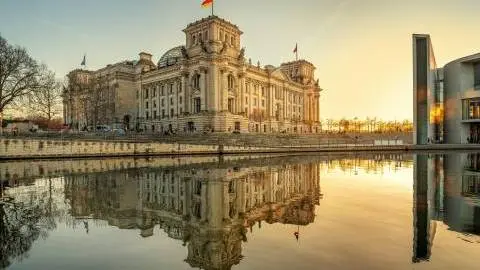Germany’s second election debate brings heated discussions but no winner
With one more week to go until Election Day, the second tv debate brought the candidates of the four largest parties together in a sometimes heated discussion. The debate is unlikely to have significantly moved the needle but in these elections small shifts can make a big difference
Another Sunday, another German election tv debate but this time it wasn’t a duel but a ‘quadrell’; a discussion of the four potential next chancellors of Germany: Olaf Scholz (SPD), Friedrich Merz (CDU), Alice Weidel (AfD) and Robert Habeck (Greens). It was actually the first time in this election campaign that these four politicians came together in one live tv event.
Ahead of the tv debate, opinion polls had the CDU at 30%, the AfD at 20%, the SPD at 15%, the Greens at 13%, the Left Party at 6%, BSW at 5% and the FDP at 4%. Our feeling is that today’s debate hasn’t significantly shifted the needle.
The debate
The debate tackled the topics of (illegal) immigration, the economy, Ukraine and defence, housing and pensions. The interesting aspect of today’s format was that the viewers could see all four candidates at the same time and sometimes even in direct interaction. All four candidates were able to present their well-known policy proposals and sometimes tried to confront political opponents.
As regards the economy, the debate remained superficial and only brought an exchange of the well-known policy proposals. Proposals which follow in fact an almost stereotypical distinction between centre-left and centre-right economic policies. Investment subsidies, tax hikes for the highest incomes and changes to the debt brake from Scholz and Habeck; tax cuts for corporates and households, public expenditure cuts, sticking to the debt brake and hoping for the magic Laffer curve to bring in more tax revenues via higher growth from Merz. Weidel shared the policy proposals from the party’s programme, intending to lower energy costs and taxes. Unfortunately, the debate on the economy was too much backward-looking, trying to point the finger, and too little forward-looking. A bit scary as it suggests that the sense of urgency that the economy needs a huge overhaul has faded away again, or is not deemed digestible for most voters.
Contrary to last week’s tv debate between Olaf Scholz and Friedrich Merz, the fiscal debt brake was only touched marginally and the two moderators missed the opportunity to press for clear answers during the discussion on economic plans and the need to increase defence spending. Interestingly, earlier this week, the Ifo institute released a study estimating the fiscal impact of the different political programmes. Of the four parties represented in today’s debate, CDU and AfD had the largest funding gap (96.7bn euro and 154.6bn euro respectively), while SPD and Greens (8.4bn euro and 2.5bn euro) had almost fully funded plans. To finance the plans of AfD and CDU, according to the Ifo institute, one option would be to increase the VAT from currently 19% to more than 27% or 24% respectively. We don’t know how Donald Trump would react. In any case, it is clear that the political parties in favour of sustainable public finances and sticking to the debt brake have the largest funding gap.
One more week to go until Election Day
More than one-quarter of German voters haven’t made up their minds, yet. With just one week to go until election day, strategic voting will also become an important driver. While the opinion polls have been relatively stable for the CDU and AfD, in recent days, the smaller left-wing parties, Die Linke and BSW, have seen an increase in voters’ support. This rise of the left is actually an important reason for not entirely ruling out that Olaf Scholz could still manage to get a second term in office or that even Robert Habeck becomes next German chancellor. It’s a highly unlikely but not entirely impossible scenario if SPD, Greens, Die Linke and BSW could manage to get more than 50% of the votes. The more likely outcome, however, is still a government led by the CDU.
In any case, we can only remind you of the fact that the election day will be more exciting than many think. The day could end with as many as eight but also as little as four parties in parliament. It could end with the far right AfD as the second (or) largest party and will in any case mark the start of very complicated coalition talks. The more parties in parliament, the more parties will probably be needed to form a coalition.
All in all, the German election campaign has entered the final stretch. A crucial election for Germany, but also for Europe. We still expect a mild fiscal stimulus after complicated coalition talks, garnered with some structural reforms. Whether this will be enough to substantially restore German competitiveness is a different question.
This publication has been prepared by ING solely for information purposes irrespective of a particular user's means, financial situation or investment objectives. The information does not constitute investment recommendation, and nor is it investment, legal or tax advice or an offer or solicitation to purchase or sell any financial instrument. Read more
Download
Download snap
16 February 2025
German election countdown 2025 This bundle contains 4 Articles